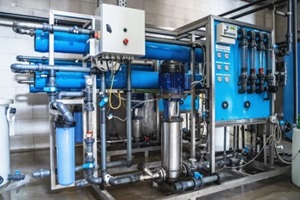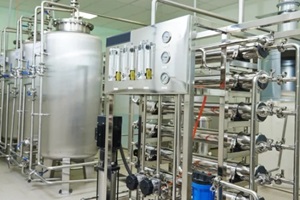 Preventing microbiological growth and corrosion in building HVAC systems is essential for maintaining a safe environment and efficient operation. Glycol, a key component in many of these systems, plays a pivotal role in preventing the growth of harmful microorganisms while also protecting systems from corrosion.
Preventing microbiological growth and corrosion in building HVAC systems is essential for maintaining a safe environment and efficient operation. Glycol, a key component in many of these systems, plays a pivotal role in preventing the growth of harmful microorganisms while also protecting systems from corrosion.
To help improve your understanding, we’re going to look at the importance of regular maintenance, the benefits of using glycol-based solutions, and how utilizing glycol filling and cleaning services can prolong the life of your building’s systems while ensuring optimal performance.
Whether you’re new to building management or looking to update your maintenance practices, this article offers valuable insights and practical tips for safeguarding your property against these common yet preventable issues.
Understanding the Threats to Your Cooling System
Microbiological growth and corrosion in cooling systems both pose significant risks to your building, including reduced efficiency, increased energy costs, and even potential health hazards.
Cooling systems, with their moist conditions, provide a perfect breeding ground for various microorganisms including bacteria, algae, and fungi. These organisms can lead to the formation of biofilms, or complex matrices that adhere to surfaces and can reduce heat transfer efficiency, lead to the deterioration of piping and components, and contribute to the spread of harmful bacteria, such as Legionella, in the air.
Corrosion in HVAC systems is primarily caused by the presence of oxygen, water, and metal, which leads to the gradual degradation of the system. This process ultimately results in leaks, reduced efficiency, and, eventually, system failure. In addition to the physical damage you may face, corrosion can create an environment conducive to microbiological growth, compounding two problems at once.
The Role of Glycol in Cooling Systems
Glycol, particularly propylene glycol and ethylene glycol, is widely used in HVAC systems for its antifreeze and anti-corrosive properties. These glycols lower the freezing point of the fluid in the system, preventing freeze damage in colder climates. Moreover, glycol-based solutions can inhibit corrosion and microbiological growth, thereby extending the system’s lifespan and maintaining its efficiency.
Glycol solutions hinder microorganism growth by fostering an environment that doesn’t allow them to survive. Unlike water, a natural medium for microbial life, glycol solutions do not support the same level of biological activity. When properly maintained, glycol-based systems can significantly reduce the risk of biofilm formation.
Glycol also serves as a corrosion inhibitor, forming a protective layer on metal to reduce direct contact with corrosion-causing elements. This protective layer is essential to preventing the key processes that cause corrosion.
Best Practices for Glycol Filling and Cleaning Services
 When it comes to glycol filling and cleaning services, adhering to best practices is key to maximizing the efficiency and longevity of HVAC systems. During the glycol filling process, it’s essential to ensure that the glycol concentration is correctly balanced for the system’s operating conditions.
When it comes to glycol filling and cleaning services, adhering to best practices is key to maximizing the efficiency and longevity of HVAC systems. During the glycol filling process, it’s essential to ensure that the glycol concentration is correctly balanced for the system’s operating conditions.
An incorrect glycol-to-water ratio can lead to various issues, including inadequate freezing protection or insufficient defense against microbial growth and corrosion. Once the system is operational, regular testing and maintenance become key, which involves routinely checking the glycol solution for appropriate pH levels, concentration, and potential contaminants.
Such vigilance helps maintain the solution’s protective properties against biological growth and corrosion while ensuring the system operates at peak efficiency.
Over time, glycol solutions can degrade or become contaminated, necessitating a thorough system flush and refill. This process should include draining the old solution, meticulously cleaning the system to eliminate any biofilm or corrosion deposits, and then refilling with a fresh glycol solution.
Continuous monitoring of the system is also vital; this includes checking for leaks, monitoring temperature and pressure levels, and inspecting for signs of corrosion or biological growth. Building owners and managers can significantly enhance the performance and durability of their HVAC systems by following these best practices, ensuring they remain efficient, safe, and reliable for the long term for years to come.
Trust Tower Water’s Glycol Filling & Cleaning Services
The challenges of mitigating microbiological growth and corrosion in HVAC systems are significant, but they can be effectively managed by taking the right approach. Utilizing a professional glycol filling and cleaning service can help extend the lifespan of your building’s HVAC systems while ensuring their efficient operation, contributing to a safer and healthier environment for its occupants.
The expert treatment team at Tower Water has comprehensive glycol filling and cleaning services that keep clients operational year round. Our knowledgeable water treatment professionals are adept at guiding and assisting you to ensure your systems are operating at their very best, all year long. Specializing in an array of water treatment services, we pride ourselves on developing long-lasting relationships with our clients by offering customized solutions tailored to your needs.
Begin protecting your building’s systems by proactively inhibiting microbiological growth and corrosion with our glycol filling and cleaning services. Contact Tower Water today at 1-212-518-6475 or schedule a consultation online to learn more about our specialized water treatment services. Let us help you achieve all of your water treatment goals with a single provider, ensuring a lasting relationship built on earned trust, unrivaled expertise, and custom-tailored solutions.
